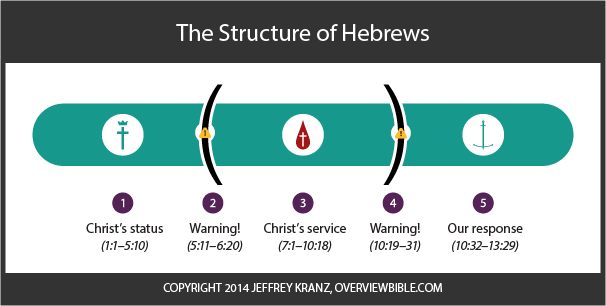
One exercise I like to do when outlining a book of the Bible is finding a theme verse (sometimes a couple of verses) that nicely sums up the book—or at least gives me a hint at its structure. When I wrote my first overview of Hebrews, I landed on this:
Let us hold fast the confession of our hope without wavering, for He who promised is faithful; and let us consider how to stimulate one another to love and good deeds. (Heb 10:23–24)
Unlike some books, the epistle to the Hebrews doesn’t have a clear-cut verse that everyone agrees is the theme of the whole book. Here’s why I use Hebrews 10:23–24 as the theme verses for the book.
What I mean by “theme verse”
First of all, I should probably define “theme verse” for this conversation.
Theme verse = a verse or set of verses that sums up the story, structure, and/or theme of the book of the Bible it was written in.
The “theme verse” concept isn’t something the original authors of the Bible had in mind. The Bible wasn’t divvied up into chapters and verses until long, long after the authors were dead. So when we talk about theme verses, we’re not discussing how the Bible describes itself. Plus, we don’t all have the same definition of “theme verse,” so there’s another layer of complexity in the conversation.
But as for me, when I look for a theme Bible verse for a book or chapter, I have two questions in mind:
- How can I concisely use Scripture to remember Scripture?
- How can I concisely use Scripture to teach Scripture?
We can always write our own outlines, high-level takeaways, and acrostics. But it’s nice to have a verse to quote alongside those things.
Why Hebrews 10:23–24 are the theme verses
If you’ve been following this site for a while, you’ve already seen my breakdown of the book’s structure:
The author writes a letter of exhortation to Hebrew Christians, and it’s primarily a long, long list of reasons to cling to Jesus. In the first section, the writer lists ways Jesus is superior to Old Testament figures:
- Jesus is greater than angels (He 1:4).
- Jesus is greater than Moses (3:3).
- Jesus is greater than Joshua (4:8).
This is also where the author shows how Jesus is God, the Son of God, and the great high priest of God. After warning the listeners not to be “sluggish” in applying their faith, he moves on to describe Jesus’ ministry as our high priest.
Then comes another warning: if we know all this about Jesus, we’d better be faithful to him. There’s nothing else out there for us if we turn up our nose at his sacrifice. And what does faithfulness look like? The author spends the rest of the book describing that.
That’s a really, really high-level overview of Hebrews, but it should serve as a foundation for understanding this list of reasons why I use Hebrews 10:23–24 as the theme verses of the book.
4 reasons these are the theme verses of Hebrews
1. “Hold fast our confession.” This is the main action item for the book of Hebrews. “Hold fast our confession” shows up in the first section of the epistle (3:6, 14; 4:14), and then the author really brings it home in chapter 10. This is the big application point in the book, and these verses make it easier to remember and teach this truth about Hebrews.
2. “Without wavering.” You’ll notice in the diagram above that the theme verse falls into the second of those parenthesis-warnings (10:19-31). The author urgently warns the readers not to turn away from the gospel of Jesus in this letter.
3. “He who promised is faithful.” Hebrews is about covenant, and covenants are built on promises. In Bible times, a covenant was an agreement that joined two people (or people groups) together: two became one based on the promises they made to one another. The author of Hebrews spends a good amount of time talking about the new covenant that Jesus initiated, and how much better it is than the old one (the Law of Moses). These verses tell us that he who promised is faithful, which helps us remember and teach the covenant themes in Hebrews.
4. “Stimulate one another to love and good deeds.” This is what holding fast to our confession without wavering looks like. It’s a community responsibility—a team sport. The rest of the book examines what this should look like in the lives of the readers.
There you have it! These verses are a great way to remember what Hebrews is about, and a cool starting point for teaching others what it’s about, too. If you’re the verse-memorizing type, this is a great set to have in your mental back pocket.



